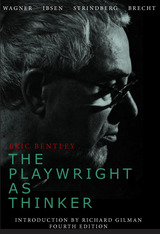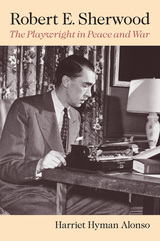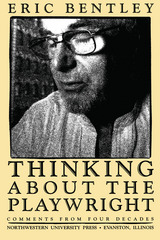4 books about Playwright

The Playwright as Thinker
A Study of Drama in Modern Times, Fourth Edition
Eric Bentley
University of Minnesota Press, 2010
First published in 1946, The Playwright as Thinker is a classic work of drama criticism that helped create the intellectual environment in which serious American theater would thrive in the second half of the twentieth century. At the time of publishing, most drama critics believed dramatic art deserved no intellectual status; Eric Bentley set out to prove them wrong. Focusing on the canonic playwrights Strindberg, Ibsen, Pirandello, Sartre, and Brecht, Bentley viewed the playwright as thinker, and his survey of over 150 years of dramatic art provided, in essence, an intellectual history of Europe. This edition not only contains the original, long-suppressed foreword, in which Bentley lambastes the climate of Broadway at the time, but also the author's 1987 afterword.
[more]

Robert E. Sherwood
The Playwright in Peace and War
Harriet Hyman Alonso
University of Massachusetts Press, 2007
One of the nation's first film critics, an acclaimed speechwriter on his own and for President Franklin D. Roosevelt, a propagandist during World War II, and a leading producer on Broadway, Robert E. Sherwood scripted some of the most popular plays and films of his day, including Waterloo Bridge, The Best Years of Our Lives, Idiot's Delight, Abe Lincoln in Illinois, and Rebecca. His work brought him four Pulitzer Prizes and an Oscar. In his personal life, however, he was driven by a deep conviction that war was a societal evil that must be eradicated and human rights a moral responsibility that all governments should protect. At times, his belief in pacifism and his commitment to defending freedom and justice came into conflict with each other, causing frustration and emotional trauma which found their way into his writings and actions.
In this book, Harriet Hyman Alonso unravels Sherwood's inner struggle and portrays his political journey. Relying largely on his letters, diaries, plays, films, essays, and biography of Roosevelt and Harry Hopkins, she traces Sherwood's obsession with the world of politics and its effects on his life and art, from his experience as a soldier in World War I to the Cold War. She also describes his participation in the Algonquin Round Table, his friendships and working relationships with such notables as Alfred Lunt, Lynn Fontanne, Edna Ferber, Spencer Tracy, Harry Hopkins, and Franklin D. Roosevelt, his two marriages and uneasy relationship with his daughter, and his leadership role in the Broadway community.
Alonso brings together history, theater and film studies, and peace studies in this interdisciplinary political biography. In the process, she illuminates major currents in U.S. foreign policy, society, and culture from 1896 to 1955—the years of the remarkable life of Robert E. Sherwood.
In this book, Harriet Hyman Alonso unravels Sherwood's inner struggle and portrays his political journey. Relying largely on his letters, diaries, plays, films, essays, and biography of Roosevelt and Harry Hopkins, she traces Sherwood's obsession with the world of politics and its effects on his life and art, from his experience as a soldier in World War I to the Cold War. She also describes his participation in the Algonquin Round Table, his friendships and working relationships with such notables as Alfred Lunt, Lynn Fontanne, Edna Ferber, Spencer Tracy, Harry Hopkins, and Franklin D. Roosevelt, his two marriages and uneasy relationship with his daughter, and his leadership role in the Broadway community.
Alonso brings together history, theater and film studies, and peace studies in this interdisciplinary political biography. In the process, she illuminates major currents in U.S. foreign policy, society, and culture from 1896 to 1955—the years of the remarkable life of Robert E. Sherwood.
[more]

The Similitude of Blossoms
A Critical Biography of Izumi Koyka (1873-1939), Japanese Novelist and Playwright
Charles Shiro Inouye
Harvard University Press, 1998
Izumi Kyoka (1872-1939) wrote some 300 stories, plays, and essays. In the first book-length study in English of Kyoka, Charles Shiro Inouye argues that his writings were a refinement of a vision that came into focus around 1900. This narrative archetype formed the aesthetic and ethical bases of his work. Kyoka does not fit the conventional story of Japanese literary modernization. Unlike most of his contemporaries, he did not jettison the Japanese literary tradition in favor of modernist imports from the West. The highly visual mode of figuration that was Kyoka's compromise with the demands of literary modernism allows us to see the continuation of Edo culture in the Japanese modern and expand our understanding of literary reform in the early twentieth century.
[more]

Thinking about the Playwright
Comments from Four Decades
Eric Bentley
Northwestern University Press, 1987
Essays discuss Ibsen, Strindberg, O'Neill, Brecht, Shaw, acting styles, theater controversies, translation, regional drama, and the nature of theater.
[more]
READERS
Browse our collection.
PUBLISHERS
See BiblioVault's publisher services.
STUDENT SERVICES
Files for college accessibility offices.
UChicago Accessibility Resources
home | accessibility | search | about | contact us
BiblioVault ® 2001 - 2024
The University of Chicago Press









